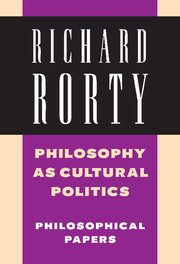Book contents
- Frontmatter
- Contents
- Preface
- Acknowledgments
- I RELIGION AND MORALITY FROM A PRAGMATIST POINT OF VIEW
- II PHILOSOPHY'S PLACE IN CULTURE
- 5 Grandeur, profundity, and finitude
- 6 Philosophy as a transitional genre
- 7 Pragmatism and romanticism
- 8 Analytic and conversational philosophy
- III CURRENT ISSUS WITHIN ANALYTIC PHILOSOPHY
- Index of names
6 - Philosophy as a transitional genre
Published online by Cambridge University Press: 05 June 2012
- Frontmatter
- Contents
- Preface
- Acknowledgments
- I RELIGION AND MORALITY FROM A PRAGMATIST POINT OF VIEW
- II PHILOSOPHY'S PLACE IN CULTURE
- 5 Grandeur, profundity, and finitude
- 6 Philosophy as a transitional genre
- 7 Pragmatism and romanticism
- 8 Analytic and conversational philosophy
- III CURRENT ISSUS WITHIN ANALYTIC PHILOSOPHY
- Index of names
Summary
REDEMPTIVE TRUTH
Questions such as “Does truth exist?” or “Do you believe in truth?” seem fatuous and pointless. Everybody knows that the difference between true and false beliefs is as important as that between nourishing and poisonous foods. Moreover, one of the principal achievements of recent analytic philosophy is to have shown that the ability to wield the concept of “true belief” is a necessary condition for being a user of language, and thus for being a rational agent.
Nevertheless, the question “Do you believe in truth or are you one of those frivolous postmodernists?” is often the first one that journalists ask intellectuals whom they are assigned to interview. That question now plays the role once played by the question “Do you believe in God, or are you one of those dangerous atheists?” Literary types are frequently told that they do not love truth sufficiently. Such admonitions are delivered in the same tones in which their predecessors were reminded that the fear of the Lord is the beginning of wisdom.
Obviously, the sense of the word “truth” invoked by that question is not the everyday one. Nobody is worried about a mere nominalization of the adjective “true.” The question “Do you believe that truth exists?” is shorthand for something like “Do you think that there is a natural terminus to inquiry, a way things really are, and that understanding what that way is will tell us what to do with ourselves?”
- Type
- Chapter
- Information
- Philosophy as Cultural PoliticsPhilosophical Papers, pp. 89 - 104Publisher: Cambridge University PressPrint publication year: 2007
- 25
- Cited by



